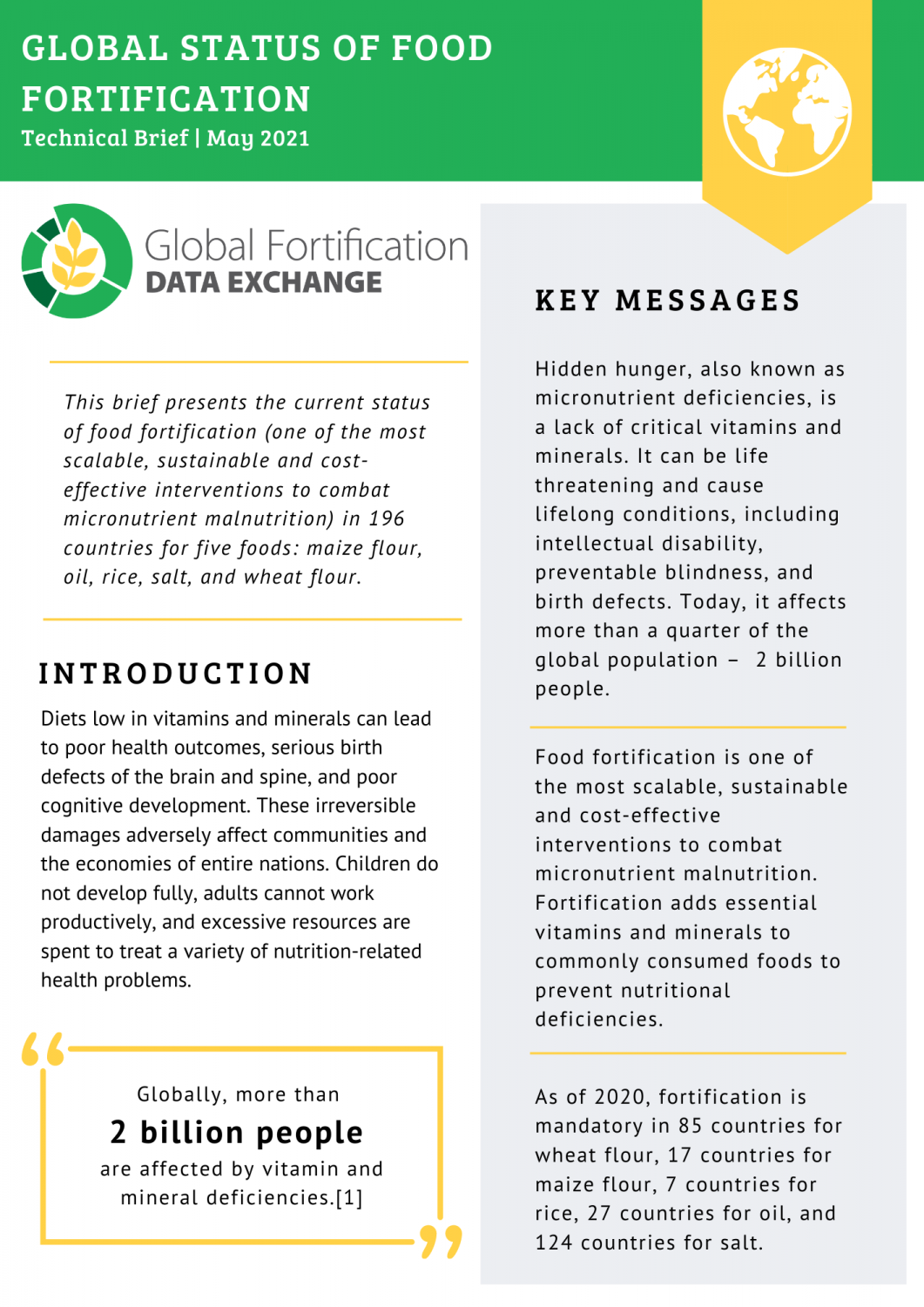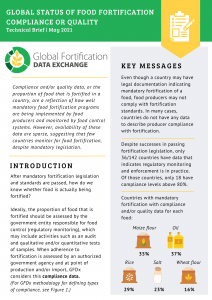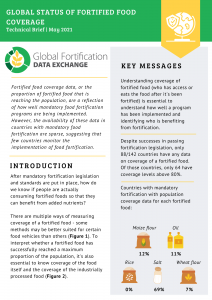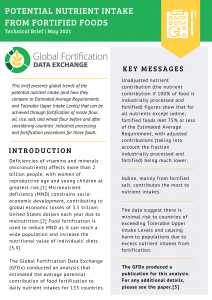Fortification Resources
Welcome to the GFDx resource center. Below you’ll find a curated collection of essential materials on food fortification. For a more comprehensive library of resources, we recommend visiting the GFDx Secretariat organizations’ websites: Food Fortification Initiative, Global Alliance for Improved Nutrition, Iodine Global Network, and Micronutrient Forum.
We value your feedback—if you have questions about these materials or suggestions for additional resources, please contact us.
Click on a topic below to view links to fortification resources
Technical Briefs and Publications
GFDx produced technical briefs to highlight global progress, key achievements, program gaps, dissonance with fortification best practices, and general recommendations to improve food fortification programs.
In Country Case Studies
The Global Fortification Data Exchange (GFDx) was designed to empower governments, donors, implementing agencies, and other members of the global health and development community to reach populations affected by vitamin and mineral deficiencies with data-driven policy and programs. Despite global usage of GFDx among various stakeholders (such as technical staff, academics, non-governmental organizations, donors and others) website analytics for the period between 2017-2019 demonstrate that usage was low among most low- and middle-income country (LMIC) stakeholders.
To further increase usage of the platform and reinforce the value and uptake of the GFDx data for key stakeholders in-country for decision making, the GFDx secretariat held consultative dialogues with fortification stakeholders in seven countries to better understand how GFDx could be improved to better meet their decision-making needs on fortification policies and programs.
The consultative dialogues were held virtually in Bangladesh, India, Kenya, Nigeria, Pakistan, and Sri Lanka. The consultations included a variety of representatives, ranging from development partners, donors, industry, research and academic institutions, food regulators, and premix suppliers. The following are key themes and recommendations from all consultations and potential next steps for improving GFDx.
Watch GFDx
List of Publications Citing GFDx
Climate change is a pressing global threat. Greenhouse gas emissions allow for heat to be trapped in the atmosphere, ultimately leading to increased surface temperatures on earth. Carbon dioxide (CO2) is the most common greenhouse gas emitted through human activities, and atmospheric levels are at an all-time high. CO2 emissions are harmful to the planet, and the potential impacts on human health and nutrition are life threatening.
Climate change is much more than an environmental issue – it’s a nutrition issue. Studies show that many plants grown under conditions of higher CO2 levels suffer a decrease in micronutrients including B vitamins, zinc, and iron. Preventing climate change is of utmost importance. When addressing issues brought on by climate change, it’s important that populations don’t become at risk for micronutrient deficiencies. Food fortification can help fill the micronutrient gap that millions of people will be more vulnerable to because of a less diverse diet.
Useful links:
- Human-wrought environmental changes impacting crops and pollinators could harm health of millions
- Rising temperature and carbon emissions decrease food’s nutrient quality
- As Carbon Dioxide Levels Rise, Major Crops Are Losing Nutrients
- The effects of elevated atmospheric carbon dioxide [CO2] on micronutrient concentration, specifically iron (Fe) and zinc (Zn) in rice; a systematic review
- Rising atmospheric CO2 increases global threat of zinc deficiency
- Impact of anthropogenic CO2 emissions on global human nutrition
- Fortifying Our Food to Fight Climate Change
- Ensuring Nutritious Food Under Elevated CO2 Conditions: A Case for Improved C4 Crops
- The Potential Impact of Climate Change on the Micronutrient-Rich Food Supply
- Balancing a sustained pursuit of nutrition, health, affordability and climate goals: exploring the case of Indonesia
- COVID-19 and Micronutrients Resource Hub
- GAIN, SUN and Nutrition Connect hosted a webinar on COVID & fortification on Wednesday, 10/7 at 14.30 CEST – view the recording at https://nutritionconnect.org/webinar-fortification-covid19
- GAIN Premix Facility (GPF)
The GAIN Premix Facility conducts technical audits on micronutrient premix blenders around the world to support access to quality-assured premix for food fortification. They also organize competitive tenders for premix procurement – to learn more, please visit: http://gpf.gainhealth.org/ - Fortification Assessment Coverage Toolkit (FACT)
Fortification Assessment Coverage Toolkit (FACT) is designed for carrying out coverage assessments of fortification programmes. The FACT consists of a manual and 10 practical tools and templates that provides standardised methods for the collection, analysis, and synthesis of data on quality, coverage, and consumption of fortified foods across countries while allowing for adaptations to meet specific country needs and contexts.
-
- Fortifying our Future: a Snapshot Report on Food Fortification
- World Food Programme Executive Board policy regarding fortification, Rome, 24–26 May 2004
- European Commission Food Fortification Global Mapping Study 2016
- The Arusha Statement on Food Fortification
- The Lagos Statement on Nigeria Food Fortification
- Large Scale Food Fortification in India: The Journey So Far and Road Ahead
- The #FutureFortified Global Summit on Food Fortification: Event Proceedings and Recommendations for Food Fortification Programs
- Second Copenhagen Consensus (2008): Micronutrient Fortification Best Practice
Horton S, Mannar V, Wesley A. Micronutrient Fortification (Iron and Salt Iodization). Best Practice Paper: New Advice from CC08. 2008. - Third Copenhagen Consensus (2012): Challenge Paper on Hunger and Malnutrition
Hoddinott J, Rosegrant M, Torero M. Investments to reduce hunger and undernutrition. April 9, 2012. - Grain Fortification to Address the Sustainable Development Goals
- North American Teratology Society resolution on folic acid fortification (2014)
- Effect and safety of salt iodization to prevent iodine deficiency disorders: a systematic review with meta-analyses
Aburto N, Abudou M, Candeias V, Wu T. Effect and safety of salt iodization to prevent iodine deficiency disorders: a systematic review with meta-analyses. WHO eLibrary of Evidence for Nutrition Actions (eLENA). Geneva: World Health Organization; 2014. - Evidence of the effectiveness of flour fortification programs on iron status and anemia: a systematic review
Pachón H, Spohrer R, Mei Z, Serdula M. Nutr Rev. 2015 Nov;73(11):780-95. - Folic acid to reduce neonatal mortality form neural tube disorders
Blencowe H, Cousens S, Modell B, Lawn J. International Journal of Epidemiology. April 2010 (suppl_1):i110-i121. - Impact of folic acid fortification of flour on neural tube defects: a systematic review
Castillo-Lancellotti C, Tur JA, Uauy R. Public Health Nutr. 2013 May;16(5):901-11. doi: 10.1017/S1368980012003576. Review. Erratum in: Public Health Nutr. 2013 Aug;16(8):1527 - Improved micronutrient status and health outcomes in low- and middle-income countries following large-scale fortification: evidence from a systematic review and meta-analysis
Keats EC, Neufeld LM, Garrett GS, Mbuya MNN, Bhutta ZA. Improved micronutrient status and health outcomes in low- and middle-income countries following large-scale fortification: evidence from a systematic review and meta-analysis. Am J Clin Nutr. 2019 Jun 1;109(6):1696-1708. Doi: 10.1093/ajcn/nqz023.
- Regulatory Monitoring of National Food Fortification Programs: A Policy Guidance Document
- Evidence, status and lessons learned in grain fortification
Tsang BT, Pachón H. Sight and Life, Rice Fortification in Latin America. 150-157. 2017 - Engaging Business for Nutrition Outcomes: A Compendium of UNICEF’s Experience
- WHO guideline on fortification of edible oils and fats with vitamins A and D (2025)
- UNICEF Guidance for salt fortification with iodine: a renewed commitment to achieve optimal iodine nutrition (2025)
- WHO recommendations for wheat flour fortification (2022)
- WHO guideline for fortification of rice with vitamins and minerals in public health (2018)
- WHO recommendations for maize flour fortification (2016)
- WHO recommendations for salt fortification (2014)
- WHO & FAO guidelines on food fortification with micronutrients (2006)
- Fortification Assessment Coverage Toolkit (FACT)
Fortification Assessment Coverage Toolkit (FACT) is designed for carrying out coverage assessments of fortification programmes. The FACT consists of a manual and 10 practical tools and templates that provides standardised methods for the collection, analysis, and synthesis of data on quality, coverage, and consumption of fortified foods across countries while allowing for adaptations to meet specific country needs and contexts.
- GAIN Premix Facility (GPF)
The GAIN Premix Facility conducts technical audits on micronutrient premix blenders around the world to support access to quality-assured premix for food fortification. They also organize competitive tenders for premix procurement – to learn more, please visit: http://gpf.gainhealth.org/
New electronic survey manual supports countries to combat micronutrient deficiencies developed in collaboration by WHO, CDC, UNICEF and Nutrition International. Learn more here.

















